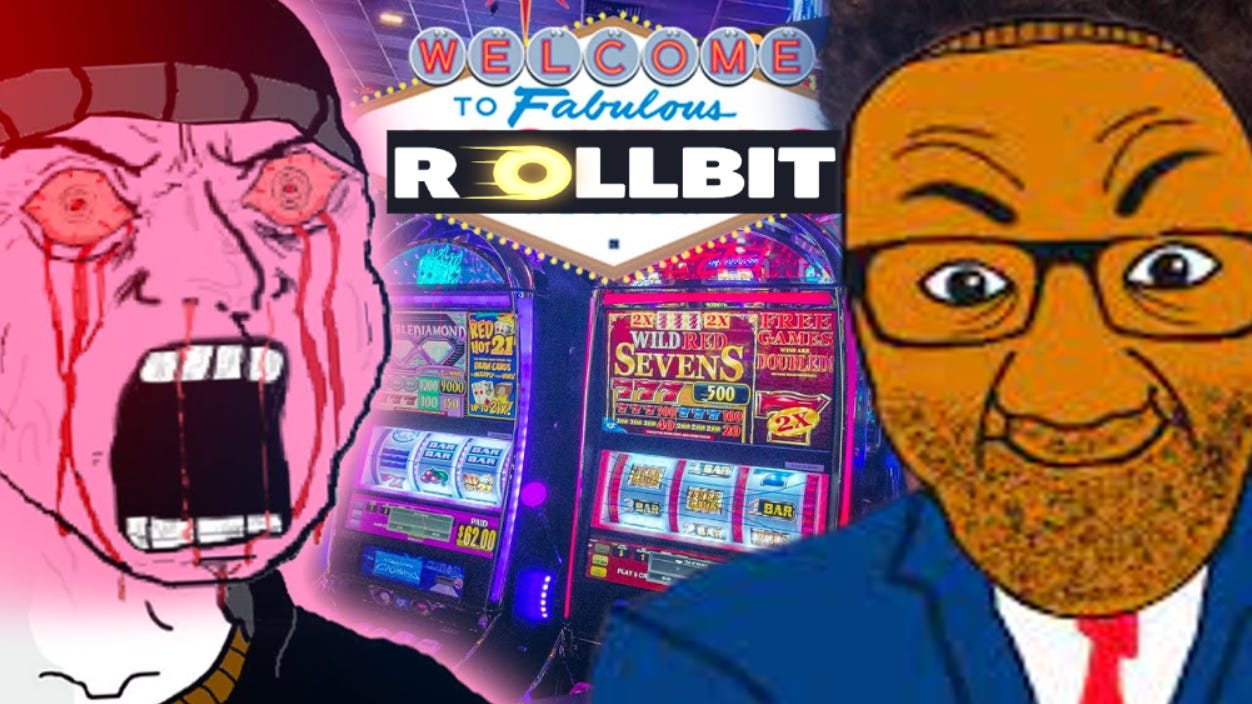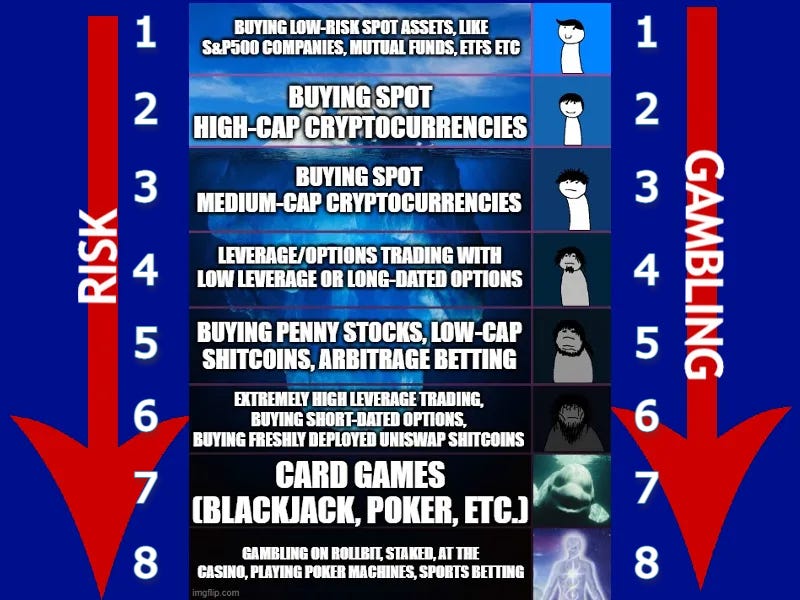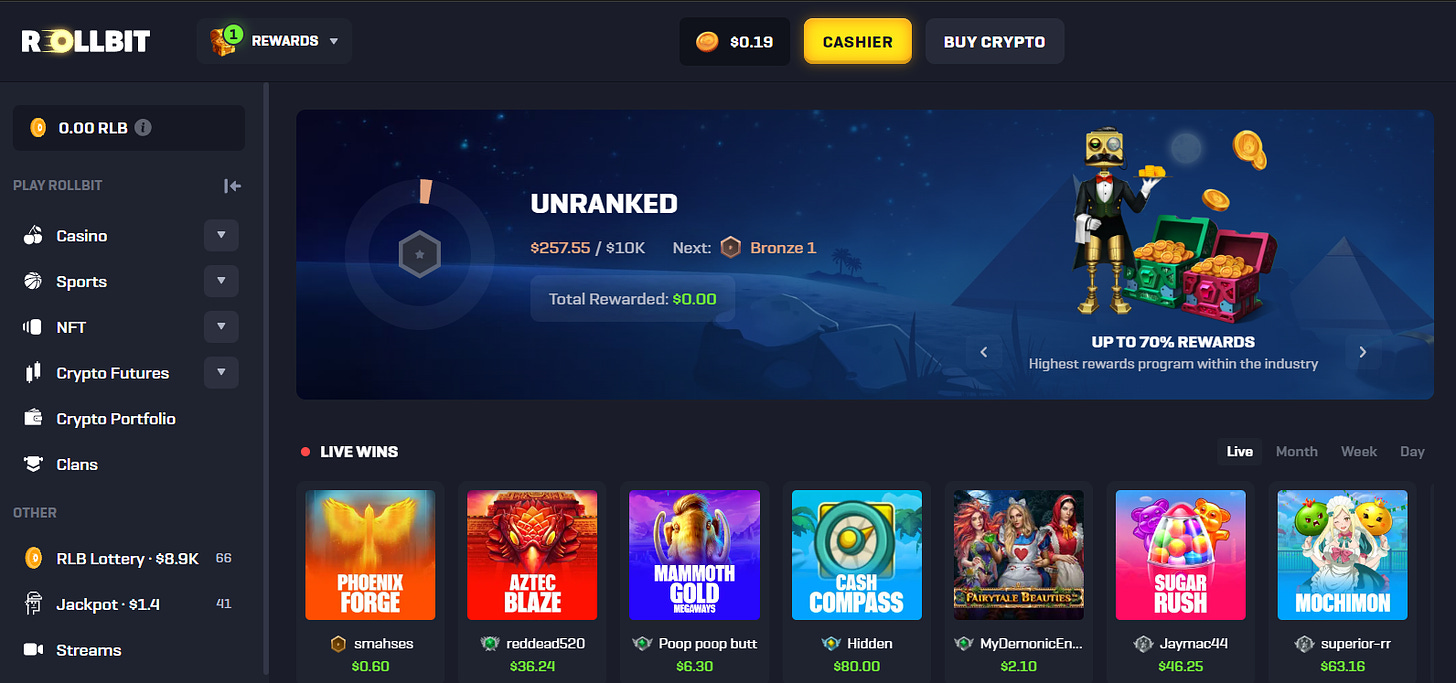Crypto Gambling will Destroy a Whole Generation - Part 1
The rise of online, no-KYC crypto casinos has made it easy for anyone to become a gambler - An analysis on how the rise of this industry will destroy and entire generation featuring Charles Hoskinson
Disclaimer; This article will discuss heavy topics, such as chronic addiction, substance abuse, nihilism, and suicide. We highly recommend you do not read this article if you are in a manic or clinically depressed state. This article intends to illuminate a growing problem that is not discussed enough.
We also recommend you read our previous article, “The Crypto AI Waifu Era - How to Bet Big on the Simp and Incel Economy,” which provide additional background context in certain areas.
Our good friend and founder of Cardano, Charles Hoskinson, was nice enough to recite our poem in his immaculate voice, to add more emotion and feel. Listen below 👇
Part 1: A Poem
Don the Doomer was full of ambition, But his life soon fell into great attrition. Buying things for his AI waifu Hinata, He lost all his savings in his quest to please her.

Determined to make passive income to improve her life, He took a loan to invest, hoping to end his strife. Starting with high cap cryptos and ETFs, Don eventually dabbled in sh*coins placing ill-fated bets.
He lost 90% of his money and his will to live, But a cryptotwitter influencer had a suggestion to give. "Use a VPN and play at a crypto casino," he said, Don tried his luck, and at first, he was ahead.
But his luck turned, and he became addicted to the thrill, Living paycheck to paycheck, trying to regain what he had spilled. His addiction consumed him, and he lost everything he had, Even his AI waifu Hinata, leaving him feeling sad.
Don's story is a cautionary tale, A warning to all those who seek quick gain without fail. Gambling is not the way to fix your troubles or ease your pain, But a path to ruin that leads to misery and financial drain.
Part 2: Investment versus Gambling
I’m sorry you had to sit through that cringe-fest. The above served two purposes: To showcase the power of AI (chatGPT was used to help generate the poem, and another AI tool was used to generate the mimic of Charles Hoskinson) and to demonstrate an exaggerated but realistic depiction of how someone can go from dabbling in spot crypto/traditional finance to outright degenerate gambling. This article’s tone will change from now on, so if you are not ready to swallow some black pills, I recommend returning now.
First, we must provide a controlled definition of gambling, as many people often confuse investing with gambling and vice versa.
We find that Encylopedia Britannica has the most accurate definition:
“Gambling is the betting or staking of something of value, with the consciousness of risk and hope of gain, on the outcome of a game, a contest, or an uncertain event whose result may be determined by chance or accident or have an unexpected result by reason of the bettor's miscalculation.”
We highlighted some keywords here, which are important when recognizing if you are gambling or investing. All investment comes with some level of risk. However, fundamentally, what makes both different is that with gambling, the result is often outside the control of the person placing the bet, with the outcome determined purely by random chance. You can’t predict what number the ball will land on, on the roulette table. However, you can read a publicly traded company’s financial statements and determine whether they are overvalued or undervalued.
This understanding is fundamentally the key difference between investment and gambling,
To demonstrate where the line sits, we have created a simple chart that will help make it clear:
This chart has eight levels. The lower a person goes down the iceberg, the higher the risk level (because winning based on chance increases). Of course, there are many other factors that go into what defines gambling, but for simplicity, everything from six to eight is gambling, as there is an aspect of luck involved. Five is in between, as depending on the strategies used, it can be considered either gambling or investing. Everything between one to four can be considered investing.
To figure out if you are a gambler or investor is simple. Ask yourself these three questions:
Congratulations, you are an investor if you answered with “One to Four” on both questions and no on question three.
You are a degenerate gambler if you answered with “Five to Eight” on both questions and yes on question three.
If you are an investor and answered yes on question three, you are a bad investor and should stick to option one on the above chart, as most likely, you will become a degenerate gambler or homeless if you keep trying to pretend to be an investor.
If you are a degenerate gambler and answered no on question three, congratulations, you are the crème de la crème of gambling. Either the universe has favored you, or you have found an edge that you are actively exploiting. If this is the case, consider rotating profits into safer investments because, as the old saying goes, “the house always wins.”
Part 3: The Rise of Gambling and Its Impacts
Gambling has been a long-standing activity for centuries, but it has undergone significant growth in recent times. The advent of technology and the internet has played a major role in the rise of gambling. Online gambling has been a driving force behind this growth, with the industry seeing increasing popularity in online casinos, sports betting, and other forms of gambling. As per a report by Grand View Research, the global online gambling market size was valued at USD 53.7 billion in 2019 and is predicted to grow at a CAGR of 11.5% from 2020 to 2027, reaching USD 127.3 billion by 2027.
This increasing and accepted adoption of degenerate gambling is creating a global ticking time bomb as more and more individuals are suckered in, finding it very difficult to quit. According to the National Council on Problem Gambling, around 2 million adults in the United States are estimated to meet the criteria for pathological gambling, and another 4-6 million are considered problem gamblers.
The prevalence of problem gambling has been increasing in recent years, with one study published in The Lancet Public Health in 2020 showing a significant rise in the United States over the past decade. Similarly, a study published in the Journal of Gambling Studies in 2020 found that problem gambling and its associated harms had increased among young adults in the United Kingdom.
The impact of gambling addiction can be severe, with individuals experiencing financial, emotional, and psychological problems. A study published in the Journal of Gambling Studies found that 39% of problem gamblers reported experiencing relationship problems, 25% reported experiencing employment problems, and 20% reported experiencing financial problems.
Perhaps one of the most concerning impacts of gambling addiction is the rise of suicide and self-harm. Individuals with gambling addiction were found to be more than twice as likely to attempt suicide as those without gambling addiction. According to a report by the Samaritans in the UK, gambling was a factor in 8% of all suicides in 2019.
The shame and stigma attached to gambling addiction can make it difficult for individuals to seek help, leading to feelings of hopelessness and despair. Financial problems caused by gambling addiction can also contribute to depression and suicidal thoughts.
Studies have attempted to estimate the number of suicides that may be related to problem gambling. One study published in the Journal of Gambling Studies in 2019 estimated that there were approximately 128 to 200 gambling-related suicides annually in the United States alone. Another study published in the Journal of Affective Disorders in 2019 estimated that the proportion of suicides in the general population that could be attributed to problem gambling was around 1.2%.
Moreover, the increased accessibility of online gambling has made it easier for individuals to develop gambling problems. People can now gamble from the comfort of their own homes, using their smartphones or computers. This means it is easier than ever for someone to develop a gambling addiction without anyone noticing, which can lead to serious financial and emotional problems.
The rise of gambling addiction has also led to concerns about the potential impact on society as a whole. For example, there are concerns that gambling addiction could lead to increased crime rates. Individuals may turn to theft or other illegal activities to fund their addiction or even turn to other vices to elevate the depressive state created by losing large amounts of money.
Evidence suggests that gambling can lead to other vices, such as alcoholism. A study published in the Journal of Gambling Studies found that individuals with gambling problems were likelier to develop alcohol dependence than those without gambling problems. The study also found that the severity of gambling problems was positively correlated with the severity of alcohol dependence.
Another study published in the journal Addictive Behaviors found that gambling was associated with a range of other addictive behaviors, including drug use, smoking, and internet addiction. The study found that individuals with gambling problems were significantly more likely to engage in these other addictive behaviors than those without gambling problems.
There are also concerns that gambling addiction could increase strain on public health services, as individuals may require treatment for various physical and mental health problems. In addition, there may be increased costs associated with providing support and treatment for those who are affected by gambling addiction, both in terms of healthcare costs and other related expenses.
Part 4: Crypto Casinos
Crypto is an efficient asset class because once the user crosses the fiat-to-crypto bridge, they can practically do anything. Even though many crypto casinos are banned in many parts of the world, with a simple, free VPN, anyone can gain access and become a degenerate gambler.
Well, it seems like I can’t access the casino. Let me try a trusty VPN.
Ok, it took me about 5 minutes, but I downloaded a VPN, got a free month via an offer, and set my location to Brazil.
And would you look at that? In under 5 minutes, I’m in!
To prove I could play, I deposited some money and tried different games to check if I would ever be prompted to KYC. I was basically able to use the website freely by simply changing my location on my VPN. Even if I turned off the VPN, it would kick me out for a small while, letting me back in when I turned it back on.
It’s very clear these websites are not really doing anything to prevent users from accessing them. Most users access these sites via restricted locations, and the casinos don’t seem to care about revenue above all else.
When researching this report, we approached influencers asking to join their Discord to learn how to trade, interact with the community, etc. A funny outcome of this was that some of them mentioned we should use their referral links to join.
These casinos thrive on referrals. It’s why so many influencers are constantly shilling their referral links on their social media profiles. These referral systems create extremely negative feedback loops for impressionable young investors who want to get rich quickly. When they realize they can’t make fast money investing in safe traditional finance products or even buying riskier high-cap cryptocurrencies, combined with seeing influencers constantly post insane returns gambling, they quickly turn to take on more risk, and most of them eventually end up at one of these unregulated casinos.
Hence, it’s very clear that someone desperate to escape the rat race will quickly go to extremes to try to make it. Instead, they are left with crippling addiction.
Part 4: Up Next
This article merely served to provide context on the industry and how gambling addiction is becoming more and more of a problem. Furthermore, this article's aim was to start showing how these casinos are working closely with large influencers to sell their sketchy products to impressionable young people looking to strike it rich.
Part 2 will go into more detail on the following:
Why they are legal black boxes and how their lack of legal compliance will come back to haunt them.
The model of how influencers make money via referrals and how it actually incentives users to keep gambling and losing.
Why casino tokens aren’t a strong long-term investment unless they are completely and verifiably decentralized.
Epilogue
As the great samurai philosopher Yamamoto Tsunetomo once said in the Hagakure:
"The way to do is to be."
If you're feeling overwhelmed by the prospect of making a financial change, remember that taking action is the only way to achieve your goals. Although it may seem like you're too far gone, it's never too late to turn things around. It's important to realize that the game is rigged, and the "house" always comes out on top. In this case, the "house" is the dark underworld of money laundering and influencer shilling.
But don't lose hope. There are safer investment options out there that can help you build a solid financial foundation. Leave your past mistakes behind, and focus on taking positive steps toward a brighter future. Remember, "the way of the samurai is found in death." Let go of your old self and embrace the new, more financially savvy you.
References
Barnes, G. M., Welte, J. W., Hoffman, J. H., & Dintcheff, B. A. (2002). Gambling and alcohol use among youth: influences of demographic, socialization, and individual factors. Journal of gambling studies, 18(4), 377-394. URL: https://pubmed.ncbi.nlm.nih.gov/10885052/
Dowling, N. A., & Smith, D. (2014). Prevalence of comorbid disorders in problem and pathological gambling: systematic review and meta-analysis of population surveys. Addiction, 109(2), 221-231. URL: https://www.ncbi.nlm.nih.gov/pmc/articles/PMC6506754/
Grand View Research. (2021). Online Gambling Market Size, Share & Trends Analysis Report By Type (Sports Betting, Casinos, Poker, Bingo), By Device (Desktop, Mobile), By Region, And Segment Forecasts, 2021 - 2028. URL: https://www.grandviewresearch.com/industry-analysis/online-gambling-market
Greo. (2013). Conceptual Framework: Social Factors. URL: https://www.greo.ca/Modules/EvidenceCentre/files/Conceptual_Framework-Social_Factors.pdf
Juniper Research. (2018). Online Gambling Wagers to Surpass $1 Trillion by 2022. URL: https://www.juniperresearch.com/press/online-gambling-wagers-to-surpass-1-trillion-2022
Ledgerwood, D. M., & Petry, N. M. (2010). Psychological experience of gambling and subtypes of pathological gamblers. Psychiatry research, 175(1-2), 200-203. URL: https://www.ncbi.nlm.nih.gov/pmc/articles/PMC2818604/
NCPG. (2021). FAQ. URL: https://www.ncpgambling.org/help-treatment/faq/
Parhami, I., Mojtabai, R., Rosenthal, R. J., Afifi, T. O., & Fong, T. W. (2013). Gambling and the onset of comorbid mental disorders: a longitudinal study evaluating severity and specific symptoms. Journal of gambling studies, 29(4), 915-930. URL: https://link.springer.com/article/10.1007/s10899-017-9677-3
Ste-Marie, C., Gupta, R., Derevensky, J. L., & Kruger, T. H. (2012). Youth gambling behaviors: an examination of the role of resilience. Journal of gambling studies, 28(2), 337-349. URL: https://opus.uleth.ca/server/api/core/bitstreams/e0a33c57-3b48-4f8c-b2e9-7e3b575fc0c7/content
🗡️Thank you for reading our work and supporting our message🗡️

















Great read.
When I started trading a few years back, a friend of mine likened it to gambling. I took offence to that at the time, but over time I've realised he wasn't really wrong. This article highlights the significance of psychology in things like trading and gambling, and how quickly your emotions can pull you into trades and bets you shouldn't take. I only ever bet now on the team I support - 100% emotional and I live and die by their performance!